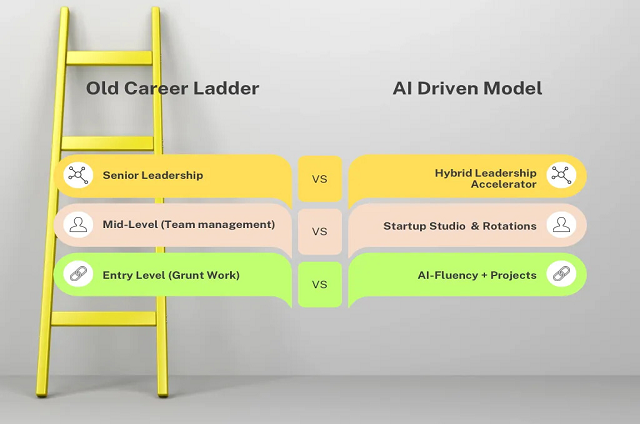By Beatrice Olumhense
A Strange Future at Work
Picture this: it is 2030. A new graduate walks into their first day at a global company. They are eager, sharp, and ready to learn. But there’s a problem — the “entry-level” job they were hired into… doesn’t really exist anymore.
Emails are drafted by AI. AI summarises reports. Data is analysed, cleaned, and visualised by AI. Even the presentation they were supposed to help prepare, done overnight by a bot.
There is no grunt work left — but without grunt work, there is also no place to start.
The Vanishing First Rung & Looming Leadership Vacuum
For decades, careers followed a familiar ladder: start in entry-level roles – the apprenticeship layer – to learn the ropes, move into mid-management, and eventually step into leadership. That ladder is splintering.
AI is devouring repetitive, process-driven work — the kind that once formed the foundation of entry-level jobs. What remains is either highly technical, deeply creative, or strategically complex. We risk creating a generation that knows theory but not practice, frameworks but not nuance, tools but not judgment. But if graduates can’t “pay their dues” through junior roles, where will they learn the operational judgment and people skills to become tomorrow’s leaders?
We are heading towards not just a “jobpocalypse” but a leadership vacuum.
The Gaps We Must Confront
- No Apprenticeship Layer: Without entry-level tasks, graduates lose the chance to observe, practice, and make small mistakes that build leadership capacity.
- Education Still Outdated: Universities continue to churn out knowledge-heavy, application-light graduates. Memorisation has a shrinking premium in a world where AI retrieves, summarises, and analyses faster than any human.
- Organisations Are Unprepared: Companies rely on junior staff as their “training ground.” Remove that, and their leadership pipeline collapses.
- Equity at Risk: Without structured entry points, only those with networks or privilege will access the kinds of early experiences that lead to leadership.
Unless we reimagine how young people learn to lead, we’re staring down a crisis far bigger than unemployment.
Critical Thoughts to Consider
- What does a career ladder look like without the first rung? Do we shift from ladders to “webs of experience” where exposure and rotations replace hierarchy?
- Can leadership be taught earlier? If students lead projects (running startups, managing AI-enabled projects, and pitching social ventures) in year two of university, will they be better prepared than traditional graduates?
- How do we make AI collaboration a leadership skill? Tomorrow’s leaders will manage both humans and algorithms — ensuring accountability, ethics, and innovation.
- Is entrepreneurship the new entry-level? Starting something small (a business, a non-profit, a micro-consulting project) may become the default way to learn.
- Should organisations rotate and mentor talent instead of delegating tasks? Letting graduates shadow decision-makers, sit in on strategy meetings, and lead micro-projects.
Rethinking Education and Work
We need to re-engineer the way people gain the skills, judgment and experience to lead. That requires bold changes from both universities and organisations.
For Universities
- Make AI fluency as essential as literacy and numeracy.
- Replace rote learning with real-world projects where students build, test, and iterate solutions.
- Introduce entrepreneurship and intrapreneurship training from year one.
- Embed leadership simulations, team rotations, and mentorship into every year of study.
For Organisations
- Create accelerated leadership pipelines — rotate young talent through multiple departments instead of assigning clerical work.
- Pair graduates with mentorship councils that expose them to decision-making early.
- Cultivate cultures where employees can launch micro-ventures inside the company.
For Society
- Accept that the “job for life” is gone. The future of work will be a mix of short projects, entrepreneurial ventures, and portfolio careers.
- Shift the question from “What job can I get?” to “What problems can I solve?”
A Provocation: Universities as Leadership Accelerators
What if universities stopped being lecture halls and producing employees but became labs for leadership?
Imagine graduating not with just a degree, but with:
- An AI-powered project portfolio,
- A startup or social venture you have co-founded,
- Experience shadowing leaders,
- And the ability to lead humans + machines in solving real problems.
This is the curriculum shift we need. Without it, the risk is clear: we may enter an AI age with no one equipped to lead it.
The Bottom Line
We cannot wait for AI to show us who the next leaders will be. If the first rung of the ladder is gone, we must build new ladders — or better yet, design elevators.
The question is no longer “How do we get young people jobs?”
It is “How do we give them the chance to lead — now?”
Because if AI takes the jobs, the only thing left worth preparing for is leadership.
**Beatrice Olumhense is a marketing leader with over 20 years experience, building brands and driving growth as well as shaping the future of marketing in Emerging Markets.

